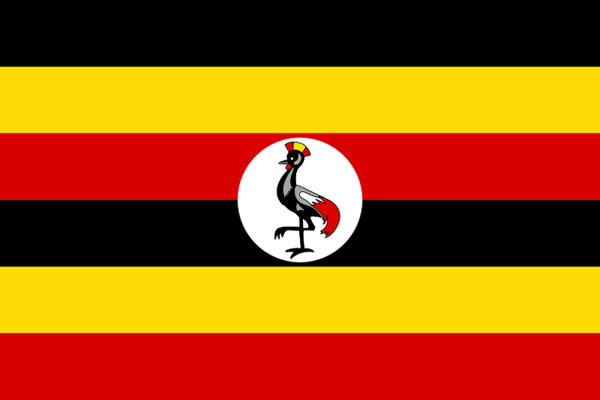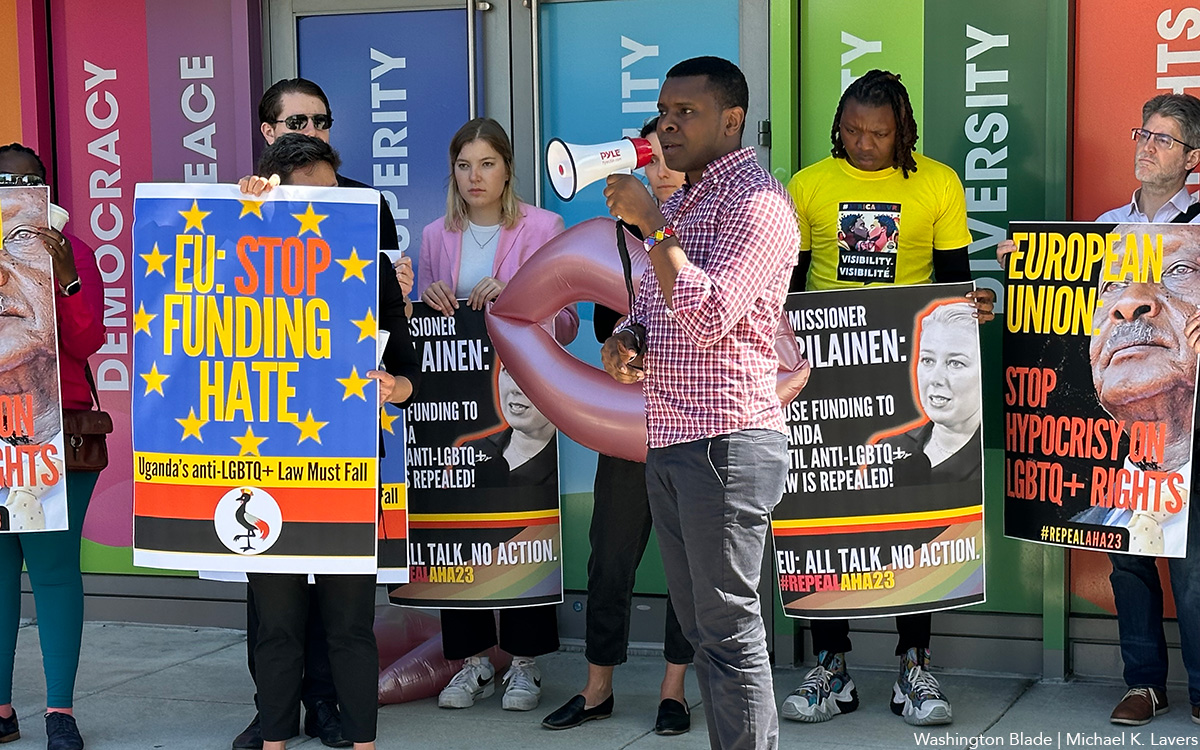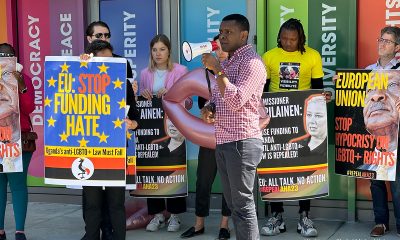World
Uganda president declines to sign queerphobic bill
Measure sent back to Parliament for review

Ugandan President Yoweri Museveni has refused to sign the country’s infamous “Sexual Offenses Bill” that Parliament approved in May, on grounds that it details offenses already covered by pre-existing laws.
“President Museveni has rejected to assent to the Sexual Offenses Bill, saying many provisions are redundant and already provided for in other legislations,” the Daily Monitor reports. “Deputy Speaker of Parliament Anita Among made the communication to the House …”
The bill has been returned to the Parliamentary Committee on Legal Affairs for review “to address the redundancies.”
Although this is a positive development for LGBTQ Ugandans and activists, the East African country is embroiled in harsh queerphobic sentiment institutionally. And there still exists a culture that makes it unsafe to live in Uganda as a queer person.
The Washington Blade spoke with Ikechukwu Uzoma, staff attorney for RFK Human Rights, and Adrian Jjuuko, executive director of Human Rights Awareness and Promotion Forum (HRAPF), before Museveni’s announcement about the details of the Sexual Offenses Bill and how its enactment could reshape Uganda’s LGBTQ landscape.
What is the Sexual Offenses Bill?
The Sexual Offenses Bill, which MP Monicah Amoding originally introduced in 2015, “seeks to consolidate laws relating to sexual offenses and provide procedural and evidential requirements during trial of sexual offenses and proposes several measures to check among others, sexual harassment in schools by guardians or teachers.”
The bill would also criminalize same-sex relationships and sex work.
“The laws were passed … reiterating sections of legislation first enforced in the country by British colonial rule,” the Guardian reports. “They condemn same-sex couples who perform acts deemed against the ‘order of nature’ to 10 years’ imprisonment.”
OutRight Action International also notes “same-sex relations have been criminalized in Uganda since British colonial times in sections 145 on ‘unnatural offenses’ and 148 on ‘indecent practices’ of the Penal Code, with a maximum sentence of life in prison foreseen. Clause 11 of the Sexual Offenses Bill further confirms this existing criminalization.”
Parliament passed the bill in May of this year. Questions regarding its legitimacy rose among LGBTQ individuals and activists as Museveni won his sixth presidential term and new MPs were sworn in.
“[When the bill was enacted], that was a time when Parliament was coming to an end, before we went into elections and [installed] a new Parliament,” said Jjuuko. “So when the new Parliament was sworn in, there was a question around what the actual legal status of a bill was that had been passed by Parliament, but not signed by the president.”
Although the proposed legislation went through an “in limbo” phase and was not fully bonafide, Jjuuko said Ugandans treated the legislation as if it were fully implemented.
“In Uganda, the law matters, but it also doesn’t. In other words it doesn’t matter what the situation is. With what the law right now is, the persecution of LGBT people will remain,” said Jjuuko.
Jjuuko further mentioned that when politicians have legislative ideas, they campaign for them in Parliament discussions and media appearances, thereby signalling to the country’s population the seriousness of whatever ideas they propose. Additionally, the word “bill” in Luganda, the country’s local language, has the same translation as the word “law.”
These campaigns, coupled with the lack of a clear distinction between a bill and law in Luganda, create a general culture where the country’s population will behave as if it were an instituted law, regardless of whether it has been signed or not.
In response to what this means for law enforcement officials and how they would treat LGBTQ citizens, Jjuuko said that police officers rely on a new form of LGBTQ persecution: Charging individuals with committing “negligent acts.”
“The police, who should know better, usually charge people with either an existing offense or some new offense,” said Jjuuko. “There’s now a new trend in Uganda [where police officers] charge someone with negligent acts of spreading disease infections, and this comes from provisions in the old penal code which is not even about COVID-19. It just [resurfaced when the pandemic began].”
Jjuuko also said the police are aware that they’re unable to charge an individual with “carnal knowledge.” They hence resort to charges of participating in intimate acts that can spread disease infections. So, even though general conversations focus on minimizing the spread of COVID-19, the larger picture depicts a commercial campaign to curb LGBTQ rights in Uganda.
This has led to an increase in mass arrests of LGBTQ individuals, with 44 people being arrested as recently as June, and consequently being charged with breaching pandemic restrictions as they pertain to the sizes of public gatherings.
What’s next?
Now that Museveni has refused to assent the bill, it has been returned to Parliament for further review. It will be presented to him again for re-consideration.
Jjuuko mentioned that if Museveni refuses to assent the bill once again, Parliament can enact it into a law by voting and taking advantage of what they call a “supermajority.”
In the event this happens Uzoma said, “it’s very easy, we [RFK Human Rights] just follow [Jjuuko’s] lead, and do whatever he tells us to do. [However], I think that [the bill being passed] really does change the matrix of decision making and planning.”
Uzoma further mentioned that whatever work RFK Human Rights is currently doing they will continue to do. If the bill is passed, it is inevitable that there will be more arrests and convictions. Therefore, the U.N.-style engagements that RFK Human Rights has had in the past around such detentions would continue.
Uzoma also said that the RFK Human Rights would also probably create a well-structured campaign that not only serves those in Uganda, but also covers the extraterritorial jurisdiction components detailed in the bill that would make it illegal for Ugandans to participate in same-sex relations outside of the country.
Jjuuko is certain his advocacy work will persist.
“I know for sure that whatever happens, our work will go on. Nothing is going to stop us because I kind of feel like we’ve lived through worse,” said Jjuuko.
Jjuuko is aware of society’s progress with adopting more favorable views of the LGBTQ community and has emphasized that this has also influenced progress for Uganda.
“There’s positive continuous progress [and] they are fighting us because they know that we are winning and making progress. So, [the endless persecutions] are signs that [the government] also realizes something is wrong in their own strategy of making sure that there are no LGBTI people in Uganda,” said Jjuuko.
European Union
Activists demand EU sanction Uganda over Anti-Homosexuality Act
Yoweri Museveni signed law on May 29, 2023

More than a dozen activists who protested in front of the European Union Delegation to the United States in D.C. on Thursday demanded the EU to sanction Uganda over the country’s Anti-Homosexuality Act.
Hillary Innocent Taylor Seguya, a Ugandan LGBTQ activist, and Global Black Gay Men Connect Executive Director Micheal Ighodaro are among those who spoke at the protest. Health GAP Executive Director Asia Russell also participated in the event that her organization organized along with GBGMC and Convening for Equality Uganda, a Ugandan LGBTQ rights group.
Ugandan President Yoweri Museveni last May signed the Anti-Homosexuality Act that, among other things, contains a death penalty provision for “aggravated homosexuality.”
The country’s Constitutional Court on April 3 refused to “nullify the Anti-Homosexuality Act in its totality.” A group of Ugandan LGBTQ activists have appealed the ruling.
A press release that Health GAP issued ahead of Thursday’s protest notes EU Commissioner for International Partnerships Jutta Urpilainen on March 6 announced more than €200 million ($212.87 million) for Uganda in support of “small business owners, young female entrepreneurs, agribusinesses as well as vital digital infrastructure projects in full Team Europe format with the European Investment Bank (EIB) and several member states.”
“These concrete initiatives will make a difference to aspiring entrepreneurs, Ugandan businesses and create jobs in multiple sectors,” said Urpilainen in a press release that announced the funds. “This is a perfect example of how Global Gateway can make a tangible difference for citizens and businesses and unlock the full potential of a partner country by working together.”
Convening for Equality Uganda on Tuesday in a letter they sent to Urpilainen asked the EU to review all funding to Uganda and “pause or reprogram any funds that go via government entities.” The protesters on Thursday also demanded European Commission President Ursula von der Leyen “to hold Ugandan President Museveni’s government accountable for this attack on human rights.”
Josep Borrell, the EU’s top diplomat, in a statement he released after Museveni signed the Anti-Homosexuality Act said the law “is contrary to international human rights law and to Uganda’s obligations under the African Charter on Human and People’s Rights, including commitments on dignity and nondiscrimination, and the prohibition of cruel, inhuman or degrading punishment.”
“The Ugandan government has an obligation to protect all of its citizens and uphold their basic rights,” said Borrell. “Failure to do so will undermine relationships with international partners.”
“The European Union will continue to engage with the Ugandan authorities and civil society to ensure that all individuals, regardless of their sexual orientation and gender identity, are treated equally, with dignity and respect,” he added.
Urpilainen last September in a letter to the European Parliament said the EU would not suspend aid to Uganda over the law.
India
Indian political parties for the first time include LGBTQ rights in election platforms
Voters will begin to cast ballots on April 19

The world’s largest democratic exercise will begin in India on April 19 as citizens begin to cast their votes in the country’s election.
This year’s election is different because national level political parties for the first time are promising to extend marriage rights to same-sex couples as part of their election platforms.
The Indian National Congress, one of India’s oldest political parties, promised after wide consultation that it would introduce a bill that would recognize civil unions between couples who are part of the LGBTQ community. The party, which has governed India for the majority of the period since independence from the U.K. in 1947, has refrained from taking a stance on laws that include Section 377, which criminalized consensual same-sex sexual relations.
Then-Health Minister Gulam Nabi Azad in 2011 when the INC was in power said homosexuality is a disease. He made the controversial comment while speaking at an HIV/AIDS conference in New Delhi, the Indian capital.
“Unfortunately, this disease has come to our country too,” said Azad. “Where a man has sex with another man, which is completely unnatural and should not happen but does.”
When the Delhi High Court was hearing the Naz Foundation case, the Home Affairs Ministry opposed the striking down of Section 377 based on its belief that homosexuality cannot be morally condoned. The INC never struck down Section 377, which criminalized homosexuality, in parliament.
A 5-judge panel on the Supreme Court on Sept. 6, 2018, decriminalized consensual same-sex sexual relations.
The Communist Party of India (Marxist) on April 4 unveiled its platform with a range of socialist commitments, including support for LGBTQ rights. Among these pledges is to amend the Transgender Persons (Protection of Rights) Act 2019 to address community concerns and ensure legal recognition and protection for same-sex couples akin to marriage.
The platform also outlined plans to introduce a bill similar to the Special Marriage Act of 1954, which allows partners to be listed as dependents and facilitating like inheritance, alimony in the event of divorce and other issues. The party further pledged to enact a comprehensive anti-discriminatory bill that would include LGBTQ people, ensure quotas in educational institutions and implement horizontal reservations in employment.
Addressing the issue of crimes against LGBTQ people, the platform promised to treat such offenses on par with crimes against heterosexuals. The platform also calls for tackling bullying, violence and harassment of gender non-conforming and LGBTQ people in educational settings, enforcing anti-hazing policies and combating hazing based on sexual orientation and gender identity.
The platform further touched issues related to transition and informed consent.
The Special Marriage Act of 1954 is a law that provides for civil unions among Indians and Indian nationals who live abroad, regardless of the religion or faith followed by either party. This law enables people from two different religious backgrounds to enter into marriage. Parliament in 2019 passed the Transgender Persons (Protection of Rights) Act that extended rights to trans people.
Brinda Karat, a former member of the Rajya Sabha, the upper house of the Indian Parliament, and leader of the Communist Party of India (Marxist), spoke with the Washington Blade and said the current government has homophobic ideas that are not acceptable to the party.
The ruling government under Prime Minister Narendra Modi is striving to secure more than 400 parliament seats in the upcoming election, aiming for a substantial majority.
Various polls conducted by Indian news organizations indicate a probable victory for the ruling Bharatiya Janata Party. In response to the BJP’s dominance, Congress and several national and regional parties have joined forces as the Indian National Developmental Inclusive Alliance.
This alliance comprises 26 opposition political parties. Despite its formation, however, there is no clear coalition strategy in place and only two parties have included LGBTQ-specific policies in their election platforms.
The Blade reached out to Congress’ spokesperson for comment, but has not received a response. The BJP also did not respond to a request for comment.
The party has yet to release its election platform.
Ankush Kumar is a reporter who has covered many stories for Washington and Los Angeles Blades from Iran, India and Singapore. He recently reported for the Daily Beast. He can be reached at [email protected]. He is on Twitter at @mohitkopinion.
Africa
Ugandan activists appeal ruling that upheld Anti-Homosexuality Act
Country’s Constitutional Court refused to ‘nullify’ law

Twenty-two LGBTQ activists in Uganda have appealed this month’s ruling that upheld the country’s Anti-Homosexuality Act.
The Constitutional Court on April 3 refused to “nullify the Anti-Homosexuality Act in its totality.”
President Yoweri Museveni last May signed the law, which contains a death penalty provision for “aggravated homosexuality.”
The U.S. subsequently imposed visa restrictions on Ugandan officials and removed the country from a program that allows sub-Saharan African countries to trade duty-free with the U.S. The World Bank Group also announced the suspension of new loans to Uganda.
Media reports indicate Sexual Minorities Uganda Executive Director Frank Mugisha and Jacqueline Kasha Nabagesara are among the activists who filed the appeal.
-

 Africa5 days ago
Africa5 days agoCongolese lawmaker introduces anti-homosexuality bill
-

 District of Columbia1 day ago
District of Columbia1 day agoReenactment of first gay rights picket at White House draws interest of tourists
-

 World5 days ago
World5 days agoOut in the World: LGBTQ news from Europe and Asia
-

 Arizona2 days ago
Arizona2 days agoAriz. governor vetoes anti-transgender, Ten Commandments bill












